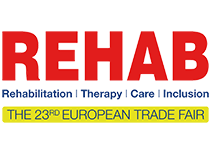These aids support people in need of care and relatives in the home
Figures published by Germany’s Federal Statistics Office at the end of 2022 clearly show how more and more people of all ages who are in need of care are receiving it at home. This places an enormous strain on relatives.
It is therefore essential that the environment in which these people live both enables the greatest degree of autonomy and provides as much support as possible to carers.
Homecare marketplace offers solutions
This subject will be the focus of the Homecare & Nursing marketplace at the 22nd REHAB trade fair in Karlsruhe from 15 to 17 June. Together with the Expertise Network for Outpatient Intensive Care (CNI) and the industry magazine beatmet leben published by hw-Studio Weber, the event will provide an overview of products and services that make life easier for people who require assistance, as well as the specialists and family members who care for them. A series of accompanying presentations by participating exhibitors will provide further information and support.
Sven Kübler from the board of the CNI explains: “Our presentations at REHAB will focus on reacting to the latest legislative developments. We will take a critical look at the implementation of Germany’s new Intensive Care and Rehabilitation Improvement Act (IPReG), for example, as well as the practical consequences for outpatient intensive care. One of the key focus areas at REHAB is care for children and young people. That is why our agenda will also look at their transition from youth to adulthood.”
One area in which the CNI and its members are particularly active is cutting bureaucracy in healthcare, a goal that the German government has agreed to pursue: “All parties recognise the pointlessness of follow-up prescriptions for aids for people who need these their entire lives. Once a need has been established, it will not go away. Patients, carers, providers, care services and medical professionals should not have to constantly worry about repeat prescriptions, as well as all the hassle that involves”, complains Kübler.

The government has already begun to simplify care. Since 2022, professional carers have been allowed to prescribe the necessary aids themselves on simplified forms, without having to get a prescription from a doctor. Specialists who know their patients well also know which bathing, hygiene, mobility, transfer and bedding aids can help them live an autonomous life.
Each person receiving care in a household can claim up to 4,000 euros to fund alterations to their home. Lawyer Jörg Hackstein explains: “This is not a one-off. The grant of up to 4,000 euros can be claimed repeatedly whenever alterations are necessary. This can be the case when an objective change in the care situation makes further improvements to the living environment necessary that were not yet required over the course of the previous alterations.”
Visitors to REHAB will be able to discover and try out countless new and proven products that improve life at home for people receiving care. The mobile lifts in particular grant users freedom of movement throughout their own home, while protecting their back during transfer at any stage of life. With market leaders like SLK, Petermann, Liftstar, Liftec and handi-move all showcasing their products, visitors will get a complete overview of this diverse market. The aids are as unique as the people who require them, with static, drivable and rail-based solutions all available.

Funding providers assume the costs for mobile ramps that help users enter their home or car. People with impaired mobility are increasingly having major alterations made to their apartments or houses, so that they can live as autonomously as possible for as long as possible in their own homes. Lifton offers compact platform lifts for interior and exterior installation. In Germany, these can be funded by the nursing care insurance budget for home improvements and cost less than a lift with cabin.
How multi-storey terraced houses become barrier-free
These compact, elegantly designed lifts require minimal ceiling penetration. They travel slowly, but can cover up to five floors. This can make even a multi-storey terraced house fully accessible, for example. Wheelchair users and people with disabilities are not the only ones who can benefit from this. Senior citizens and families with small children can also enjoy the additional convenience.
Information
Statistics show that there are around five million people in Germany in need of care. 80 per cent of these are 65 or older, and a third are at least 85 years old. The probability that we will need care increases massively as we get older. While around 9 per cent of those aged 70 to 74 required care, this figure rises to 82 per cent among the over-90s. As societies age, the people affected, their carers and political decision-makers alike must all realise this.

